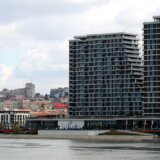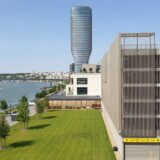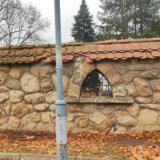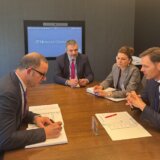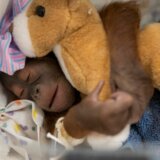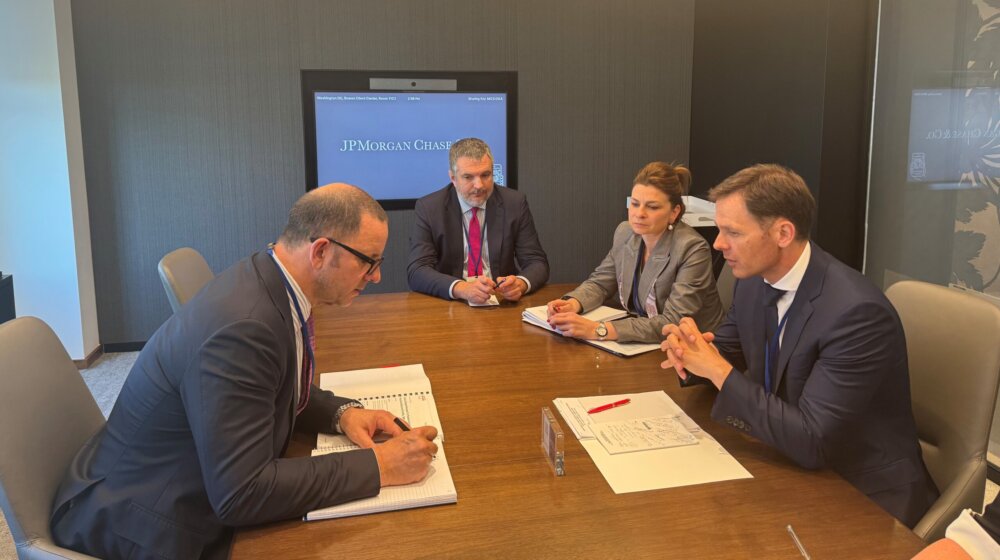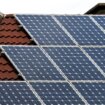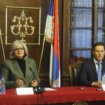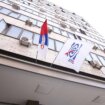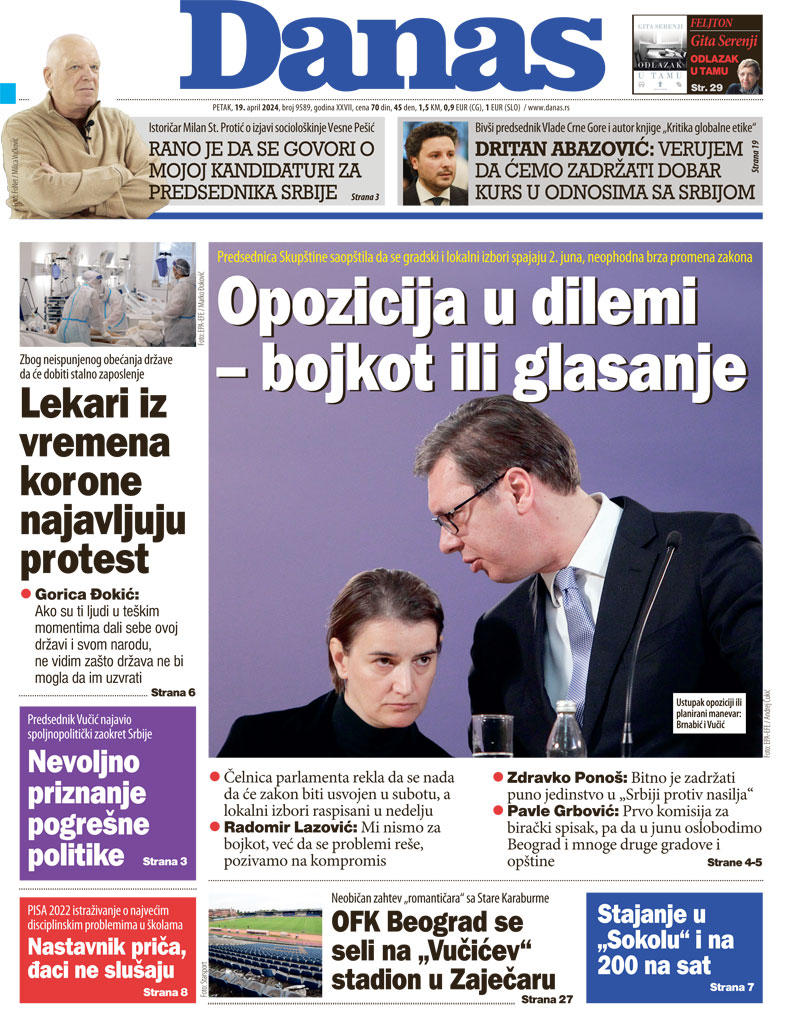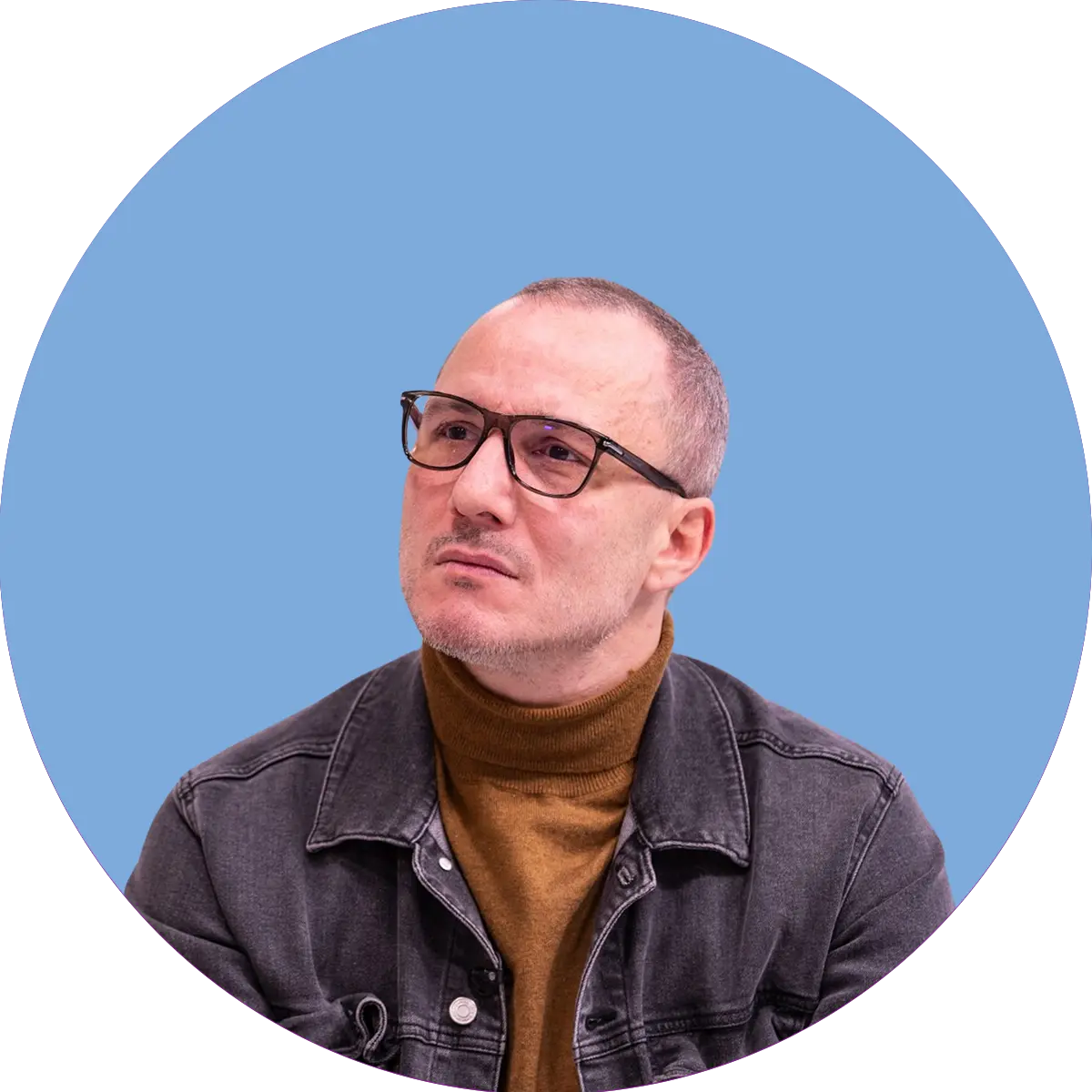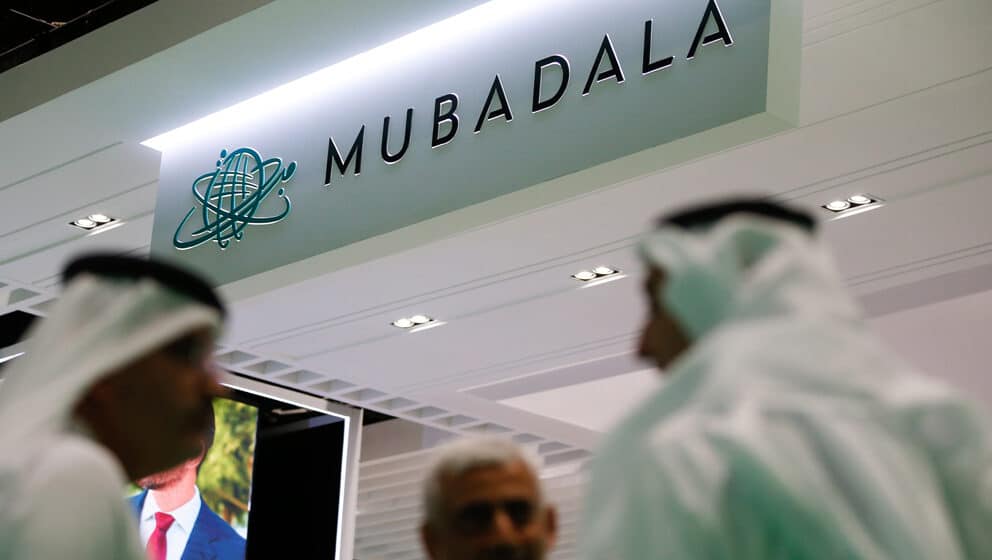 Foto: EPA-EFE/ALI HAIDER
Foto: EPA-EFE/ALI HAIDERProšla godina je pored korone možda i najviše bila obeležena prekidima u globalnim lancima snabdevanja i nestašicama pojedinih sirovina i delova za industriju.
For English version, please scroll down
Tu je verovatno najveće glavobolje zadavala nestašica mikročipova zbog čega je desetine i stotine hiljada automobila stajalo na lagerima autoproizvođača čekajući ugradnju čipova, a proizvođači mobilnih telefona odlagali premijere svojih novih modela.
Kako bi u takvoj situaciji bilo dobro imati fabriku poluprovodnika. A kada bismo se vratili u 2013. godinu mogli bismo videti vest da je potpisan Memorandum o razumevanju između Vlade Republike Srbije i kompanije Mubadala, odnosno od strane potpredsednika Vlade Aleksandra Vučića i direktora Mubadala Khaldoona Al Mubaraka i to ni manje ni više nego o izgradnji fabrike čipova.
Izjave političara u vezi ovog projekta bile su neverovatne i delovalo je kao da će Srbija u narednih nekoliko godina postati Švajcarska.
Memorandum je potpisan u oktobru 2013, a tadašnji prvi potpredsednik Vlade je u decembru izjavio da će u saradnji sa Mubadalom već do polovine 2014. biti otvorena velika fabrika aviokomponenti u Pančevu, a u roku od dve godine i fabrika čipova.
Tadašnji ministar finansija i privrede Mlađan Dinkić još pre potpisivanja je poručio da će Mubadala prvo napraviti centar za istraživanje i razvoj u šta bi uložili nekoliko stotina miliona dolara i zaposlili 50 doktora nauka, a u vezi investicije u fabriku čipova pominjalo se ulaganje od neverovatnih četiri milijarde dolara.
„U Srbiji su zainteresovani da izgrade fabriku i ta investicija, ako se dogovorimo, iznosila bi čak četiri milijarde dolara. Ovde bi se pravilo srce hardvera što bi značilo da moramo da razvijemo dodatno i neke naučne oblasti, kao što je nano tehnologija. To bi ujedno bila ubedljivo najveća investicija u Srbiji i pritom bi posao našlo 1.000 visoko kvalifikovanih stručnjaka, uključujući i naučnike. Mi za taj projekat planiramo da pozovemo srpske naučnike u svetu da se vrate“, rekao je onomad Dinkić.
Uz fabriku čipova najavljivana je i fabrika komponenti za avione koja bi opsluživala najveće svetske proizvođače, Boing i Erbas.
Vučić je za ovu fabriku rekao da bi „donela toliki profit da bi se rešio problem deficita u zemlji“, tako što bi prodavala komponente direktno iz Srbije i to za 400 do 450 miliona evra godišnje.
Navodno stručnjaci iz Mubadale su tada „već obišli prostor na kom bi trebalo da bude fabrika“ koja bi zapošljavala 1.000 visokoobrazovanih kadrova sa platom „i do 10.000 evra“.
Ubrzo je Vučić otputovao u Abu Dabi odakle se vratio sa porukom da je posao sa Mubadalom priveden kraju i da im je „već određeno zemljište u Beogradu, što nimalo nije bio lak posao zbog njihovih potreba za blizinom aerodroma“.
„Jedini problem je naći stručnjake u Srbiji za izlivanje silicijuma“, tvrdio je Vučić.
Iz Mubadale su stigle još dve najave. Jedna da će kompanija kupiti licencu za 4G mobilnu telefoniju i onda svoje kapacitete najverovatnije iznajmljivati mobilnim operaterima i druga da će sa Telekomom Srbije graditi „data centar“.
S obzirom da se u poslednjem tromesečju 2013. i početkom 2014. godine neverovatna obećanja vezana za poslove sa ovim gigantskim arapskim fondom sa sedištem u Dubaiju koji upravlja sa 230 milijardi dolara doživela vrhunac, može se zamisliti scenario u kome je to sve bila priča pred izbore u martu 2014. godine kojima je zacementirana pobeda SNS iz 2012. godine.
U to vreme gro investicija koje su dolazile u Srbiju bile su zastarele tehnologije sa manuelnim radom, takozvano „motanje kablova“ pa su egzotični haj-tek poslovi kao mikročipovi i komponente za džambo džetove slali poruku da razvijamo ekonomiju znanja. Osim toga, malo su zamaskirane i arapske investicije koje su zapravo realizovane i to u najtradicionalnije moguće sektore, poljoprivredu i nekretnine uz izdašnu pomoć države.
Nakon izbora, izjave o poslovima sa Mubadalom su se znatno proredile. Doduše u oktobru 2012. godine tadašnji gradonačelnik Beograda, a sadašnji ministar finansija Siniša Mali izjavio je kako „oni sada sondiraju naš univerzitet i procenjuju da li imamo kadrovski potencijal za takav centar. Ako to uspe, išlo bi se na izgradnju fabrike čipova na teritoriji Beograda, što je investicija od tri, četiri milijarde dolara“ uz podsećanje da oni imaju već tri takve fabrike, u NJujorku, Singapuru i Drezdenu.
„Da bi se probili u tako uski krug, treba ispuniti mnoge preduslove, kadrovske i infrastrukturno. Zato će se i raditi fazno, ukoliko ispunimo navedene preduslove“, istakao je gradonačelnik Beograda.
Ovim su se stvari postavile tako da i ako ne bude ništa od investicija to je zato što mi nismo dovoljno dobri za njih.
Sada već znamo da je cela priča o Mubadali bila samo bajka, jer osam godina od potpisivanja memoranduma nije se desilo baš ništa. Poslednjih godinu dana dana doduše imali smo izveštaje o dva susreta Vučića sa Kaldunom Al Mubarakom, prošle godine na Svetskom ekonomskom forumu u Davosu, i u martu ove godine u Abu Dabiju gde su razgovarali, ne o čipovima i avionima, već o vakcinama i borbi protiv pandemije.
* Sadržaj je rezultat istraživanja sprovedenog u okviru projekta „Transparentnost učešća države u stranim investicionim projektima“. Stavovi izneti u tekstu su stavovi autora i ne izražavaju nužno stavove donatora.
ENGLISH VERSION
A Fairy Tale about Mubadala
In addition to Covid 19, the last year was also marked by interruptions in global supply chains and shortages of a number of raw materials and parts for industry. One of the biggest problems was caused by microchip shortages, because of which hundreds of thousands of cars remained on assembly lines of car factories waiting for the microchip installation, and mobile phone manufacturers had to postpone the premieres of their new models.
How good it would have been if we had had a semiconductor factory in such a situation! Even more so given the 2013 news about the Memorandum of Understanding between the Government of the Republic of Serbia and the UAE Mubadala Investment Company, signed by the then Deputy Prime Minister Aleksandar Vučić and Mubadala CEO Khaldoon Al Mubarak, on building a microchip factory in Serbia.
The statements of the politicians regarding this project sounded too good to be true and it seemed as if Serbia would become as prosperous as Switzerland in the following few years.
The Memorandum was signed in October 2013. In December, the then First Deputy Prime Minister announced that, in cooperation with Mubadala, a large aircraft components factory would be opened in Pančevo by mid-2014, followed by a microchip factory „in which dozens of millions of euros will be invested” within two years.
Even before the Memorandum was signed, the then Minister of Finance and Economy, Mladjan Dinkić, had said that Mubadala would first build a research and development center in which they would invest several hundred million dollars and employ 50 doctors of science, and then put as much as four billion dollars in a microchip production.
„They are interested in building a factory in Serbia, and this investment, if agreed upon, would amount to as much as four billion dollars.“ This is where the heart of the hardware would be made, which means that we would have to develop further some scientific areas, such as nanotechnology. It would also be by far the largest investment in Serbia, and it would create jobs for 1,000 highly qualified experts, including scientists. We plan to invite Serbian scientists around the world to return to Serbia for this project,“ Dinkić said at the time.
In addition to the microchip production, plans for opening an aircraft component factory, which would serve the world’s largest manufacturers, Boeing and Airbus, were also announced. Speaking about this investment, Vučić said that it would „bring so much profit that it would solve the problem of the deficit in the country“ by selling components made in Serbia in the amount of 400 to 450 million euros a year. Allegedly, experts from Mubadala „already visited the area where the factory should be“, which would employ 1,000 highly educated staff with a salary of „up to 10,000 euros“.
Soon afterwards, Vučić traveled to Abu Dhabi, and announced upon return that the deal with Mubadala had been completed and that the UAE company had already been allocated a plot of land in Belgrade, which, as he said, was not an easy job due to their needs for proximity to the airport.
„The only problem is finding molten silicon experts in Serbia,“ Vučić claimed at the time.
Mubadala made two more announcements. One was that the company would buy a license for 4G mobile technology and then lease its capacities to mobile operators, and the other was that it would build a „data center“ with Telekom Srbija.
In the last quarter of 2013 and the beginning of 2014, spectacular promises related to the deal with this giant UAE fund based in Dubai, which manages 230 billion dollars, reached their peak. Given the timing of these promises, one can imagine a scenario in which they were part of the SNS campaign whoppers before the elections in March 2014, which cemented the party’s 2012 victory.
At that time, most of the investments that came to Serbia were outdated technologies focusing on manual work, the so-called „coiling-up“ investments, so prospects of exotic high-tech production of microchips and components for jumbo jets sent a message that we were developing a knowledge economy. In addition, these fabrications about the UAE high technology investments served as a smoke screen for the other UAE investments, which were realized in the most traditional sectors, agriculture and real estate, with the generous help of the state.
After the election, the statements about Mubadala investments became significantly scarcer. However, in October 2012, the then mayor of Belgrade and the current Minister of Finance, Siniša Mali, announced that „Mubadala is now probing our university and assessing whether we have the human potential for such a center. If this probing turns out to be successful, we will build a microchip factory on the territory of Belgrade, which is an investment of three to four billion dollars,“ reminding that the UAE investor already has three such factories, in New York, Singapore and Dresden.
„In order to become a member of this exclusive club, many preconditions in terms of personnel and infrastructure need to be met. That is why we will work in phases – if we fulfill the required preconditions,“ the mayor of Belgrade pointed out, implying that if there was no investment eventually, it would be because we are not good enough for them.
It is now clear that the whole story about Mubadala investments was just a fabrication. It has been eight years since the signing of the Memorandum and there have been no developments whatsoever in regard to the announced investments. More recently, however, there have been reports on two meetings between Vučić and Khaldoon Al Mubarak, at the World Economic Forum in Davos last year, and in Abu Dhabi in March 2021, where they talked, not about microchips and airplanes, but about vaccines and the fight against the pandemic.
The content is the result of the research carried out within the project „Transparency of State Participation in Foreign Investment Projects“. The views expressed in the text are those of the authors and do not necessarily reflect the views of the donor.
Pratite nas na našoj Facebook i Instagram stranici, ali i na Twitter nalogu. Pretplatite se na PDF izdanje lista Danas.

